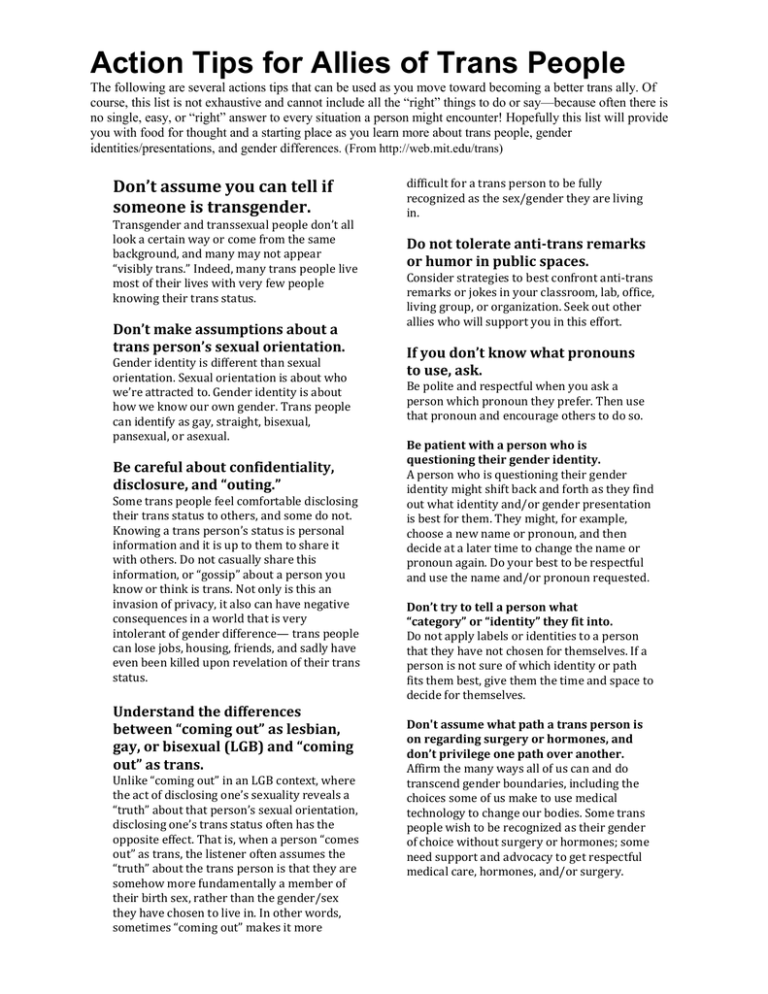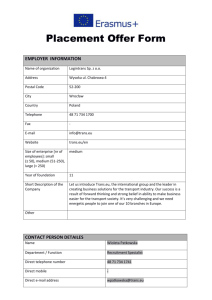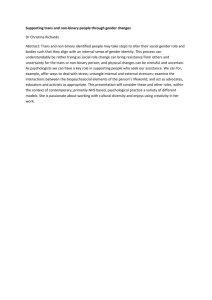
Action Tips for Allies of Trans People
The following are several actions tips that can be used as you move toward becoming a better trans ally. Of
course, this list is not exhaustive and cannot include all the “right” things to do or say—because often there is
no single, easy, or “right” answer to every situation a person might encounter! Hopefully this list will provide
you with food for thought and a starting place as you learn more about trans people, gender
identities/presentations, and gender differences. (From http://web.mit.edu/trans)
Don’t assume you can tell if
someone is transgender.
Transgender and transsexual people don’t all
look a certain way or come from the same
background, and many may not appear
“visibly trans.” Indeed, many trans people live
most of their lives with very few people
knowing their trans status.
Don’t make assumptions about a
trans person’s sexual orientation.
Gender identity is different than sexual
orientation. Sexual orientation is about who
we’re attracted to. Gender identity is about
how we know our own gender. Trans people
can identify as gay, straight, bisexual,
pansexual, or asexual.
Be careful about confidentiality,
disclosure, and “outing.”
Some trans people feel comfortable disclosing
their trans status to others, and some do not.
Knowing a trans person’s status is personal
information and it is up to them to share it
with others. Do not casually share this
information, or “gossip” about a person you
know or think is trans. Not only is this an
invasion of privacy, it also can have negative
consequences in a world that is very
intolerant of gender difference— trans people
can lose jobs, housing, friends, and sadly have
even been killed upon revelation of their trans
status.
Understand the differences
between “coming out” as lesbian,
gay, or bisexual (LGB) and “coming
out” as trans.
Unlike “coming out” in an LGB context, where
the act of disclosing one’s sexuality reveals a
“truth” about that person’s sexual orientation,
disclosing one’s trans status often has the
opposite effect. That is, when a person “comes
out” as trans, the listener often assumes the
“truth” about the trans person is that they are
somehow more fundamentally a member of
their birth sex, rather than the gender/sex
they have chosen to live in. In other words,
sometimes “coming out” makes it more
difficult for a trans person to be fully
recognized as the sex/gender they are living
in.
Do not tolerate anti-trans remarks
or humor in public spaces.
Consider strategies to best confront anti-trans
remarks or jokes in your classroom, lab, office,
living group, or organization. Seek out other
allies who will support you in this effort.
If you don’t know what pronouns
to use, ask.
Be polite and respectful when you ask a
person which pronoun they prefer. Then use
that pronoun and encourage others to do so.
Be patient with a person who is
questioning their gender identity.
A person who is questioning their gender
identity might shift back and forth as they find
out what identity and/or gender presentation
is best for them. They might, for example,
choose a new name or pronoun, and then
decide at a later time to change the name or
pronoun again. Do your best to be respectful
and use the name and/or pronoun requested.
Don’t try to tell a person what
“category” or “identity” they fit into.
Do not apply labels or identities to a person
that they have not chosen for themselves. If a
person is not sure of which identity or path
fits them best, give them the time and space to
decide for themselves.
Don't assume what path a trans person is
on regarding surgery or hormones, and
don’t privilege one path over another.
Affirm the many ways all of us can and do
transcend gender boundaries, including the
choices some of us make to use medical
technology to change our bodies. Some trans
people wish to be recognized as their gender
of choice without surgery or hormones; some
need support and advocacy to get respectful
medical care, hormones, and/or surgery.
Don’t ask a trans person what their
“real name” is.
For some trans people, being associated with
their birth name is a tremendous source of
anxiety, or it is simply a part of their life they
wish to leave behind. Respect the name a
trans person is currently using.
Don’t ask about a trans person’s
genitals or surgical status.
Think about it—it wouldn’t be considered
appropriate to ask a non-trans person about
the appearance or status of their genitalia, so
it isn’t appropriate to ask a trans person that
question either. Likewise, don’t ask if a trans
person has had “the surgery.” If a trans person
wants to talk to you about such matters, let
them bring it up.
Don’t ask a trans person how
They have sex.
Similar to the questions above about genitalia
and surgery—it wouldn’t be considered
appropriate to ask a non-trans person about
how they have sex, so the same courtesy
should be extended to trans people.
Don't police public restrooms.
Recognize that gender variant people may not
match the little signs on the restroom door—
or your expectations! Encourage schools,
businesses and agencies to have unisex
bathroom options, and offer to accompany a
trans person to the bathroom, in a “buddy
system,” so they are less vulnerable.
Don't just add the “T” without doing work.
“LGBT” is now a commonplace acronym that
joins lesbian, gay, bisexual, gay and
transgender under the same umbrella. To be
an ally to trans people, lesbians, gays and
bisexuals need to examine their own gender
stereotypes, their own prejudices and fears
about trans people, and be willing to defend
and celebrate trans lives.
Know your own limits as an ally.
Don’t be afraid to admit you don’t know
everything! When speaking with a trans
person who may have sought you out for
support or guidance, be sure to point that
person to appropriate resources when you’ve
reached the limit of your knowledge or ability
to handle the situation. It is better to admit
you don’t know something than to provide
information that may be incorrect or hurtful.
Listen to trans voices.
The best way to be an ally is to listen with an
open mind to trans people themselves. They
are the experts on their own lives! Talk to
trans people in your community. Consult the
reading and film lists of this Allies Toolkit to
find out where to learn more about trans lives




![International Modernisms [DOCX 12.72KB]](http://s2.studylib.net/store/data/015093861_1-18fe1c73606c261186fd034dd3e0bb55-300x300.png)
